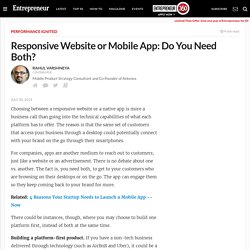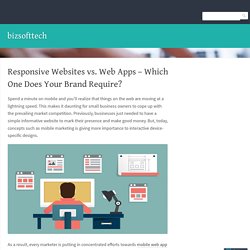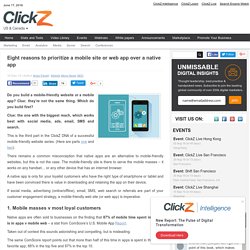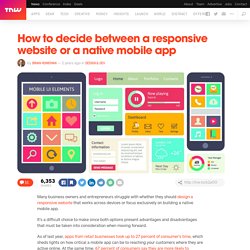

Responsive Website or Mobile App: Do You Need Both? Choosing between a responsive website or a native app is more a business call than going into the technical capabilities of what each platform has to offer.

The reason is that the same set of customers that access your business through a desktop could potentially connect with your brand on the go through their smartphones. For companies, apps are another medium to reach out to customers, just like a website or an advertisement. There is no debate about one vs. another. The fact is, you need both, to get to your customers who are browsing on their desktops or on the go. The app can engage them so they keep coming back to your brand for more. Related: 4 Reasons Your Startup Needs to Launch a Mobile App -- Now There could be instances, though, where you may choose to build one platform first, instead of both at the same time. Building a platform-first product. How best do you think you can reach out to them? Responsive Layout Vs. Native App? Which Should You Build?
There’s no denying that mobile is the future.

With Google confirming that more searches are done on mobile than on desktop, it’s abundantly clear that all websites really should go mobile if they haven’t already. But there’s an interesting dichotomy between in-browser content via responsive layouts and in-app content via native apps. I’d like to explore both areas and dig to the root of each choice. Responsive Websites vs. Web Apps – Which One Does Your Brand Require? – bizsofttech. Spend a minute on mobile and you’ll realize that things on the web are moving at a lightning speed.

This makes it daunting for small business owners to cope up with the prevailing market competition. Previously, businesses just needed to have a simple informative website to mark their presence and make good money. But, today, concepts such as mobile marketing is giving more importance to interactive device-specific designs. As a result, every marketer is putting in concentrated efforts towards mobile web app development that not only includes out-of-the-box features but also captivating user interfaces (UI).
This results in providing engaging consumer experience while helping businesses monetize. According to Cisco’s report, “By 2020, there will be 8.2 billion handheld or personal mobile-ready devices and the global mobile data traffic will increase nearly tenfold between 2015 and 2020.” Benefits of Responsive Website: Responsive Layout Vs. Native App? Which Should You Build? My Website is Responsive, So Why Do I Need a Mobile App? - Modo Labs. With internet access now available on a myriad of devices, mobile-friendly content is crucial for connecting with users as well as ranking in search results.

In the last few years, responsive design has emerged as the primary method for addressing the rapidly growing mobile users by making websites mobile-friendly. But as the user experience evolves, simply having a responsively-designed website is not enough. Overwhelmingly users prefer the experience of a native mobile app. In fact, as of early 2014, over 86 percent of our time spent on mobile devices was spent in native apps, versus just 14 percent in mobile web browsers[i].
Eight reasons to prioritize a mobile site or web app over a native app. Do you build a mobile-friendly website or a mobile app?

Clue: they’re not the same thing. Which do you build first? Clue: the one with the biggest reach, which works best with social media, ads, email, SMS and search. This is the third part in the ClickZ DNA of a successful mobile-friendly website series. (Here are parts one and two). There remains a common misconception that native apps are an alternative to mobile-friendly websites, but this is not the case. A native app is only for your loyalist customers who have the right type of smartphone or tablet and have been convinced there is value in downloading and retaining the app on their device. If social media, advertising (online/offline), email, SMS, web search or referrals are part of your customer engagement strategy, a mobile-friendly web site (or web app) is imperative. 1. Native apps are often sold to businesses on the finding that 87% of mobile time spent in the US is in apps v mobile web – a stat from ComScore’s U.S. 2. 3. Responsive Website v. Native Mobile App.
Many business owners and entrepreneurs struggle with whether they should design a responsive website that works across devices or focus exclusively on building a native mobile app.

It’s a difficult choice to make since both options present advantages and disadvantages that must be taken into consideration when moving forward. As of last year, apps from retail businesses took up to 27 percent of consumer’s time, which sheds lights on how critical a mobile app can be to reaching your customers where they are active online. At the same time, 67 percent of consumers say they are more likely to purchase from a mobile-friendly website than they are from a website not optimized for devices other than desktop.
It’s a tough call to make when deciding between responsive design or an app, but in the end, it depends on the goals of your business.